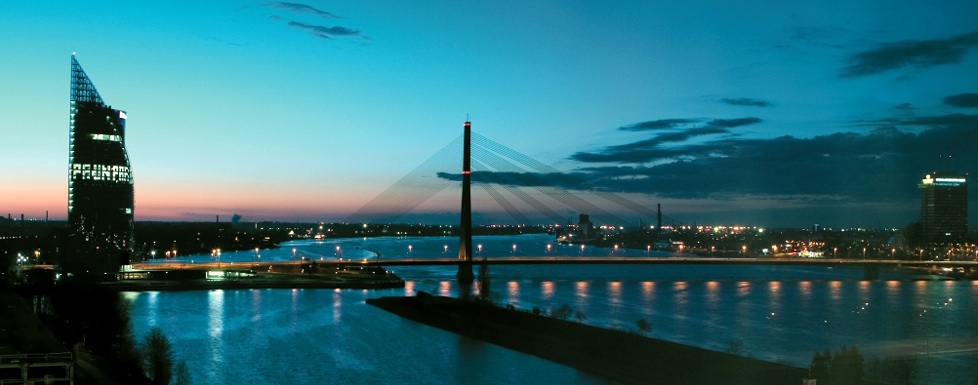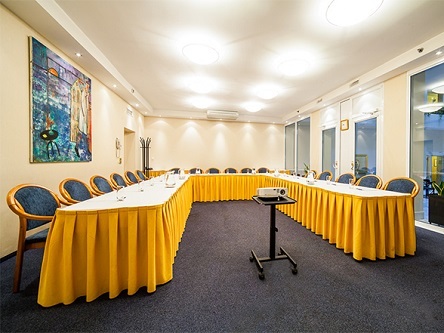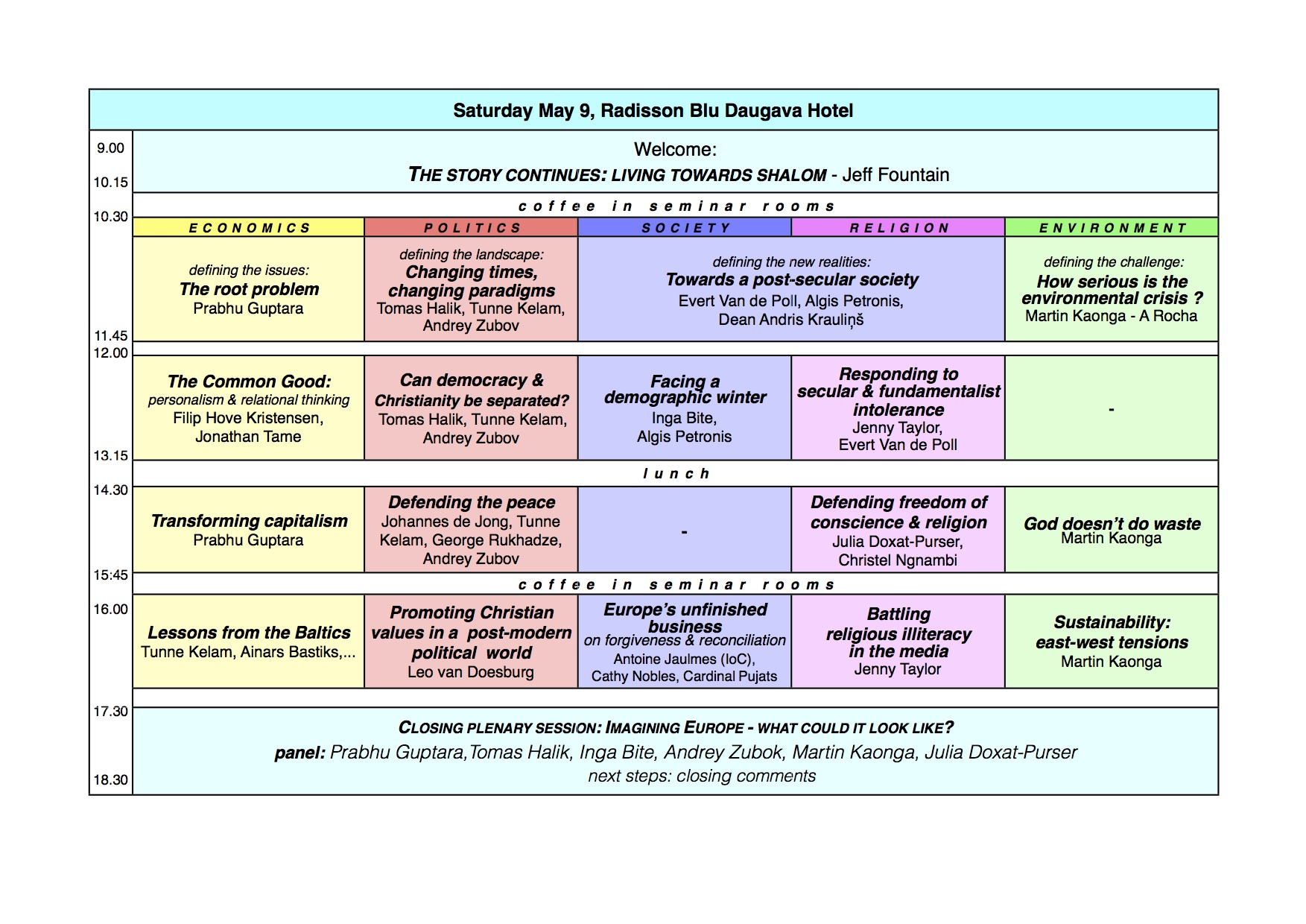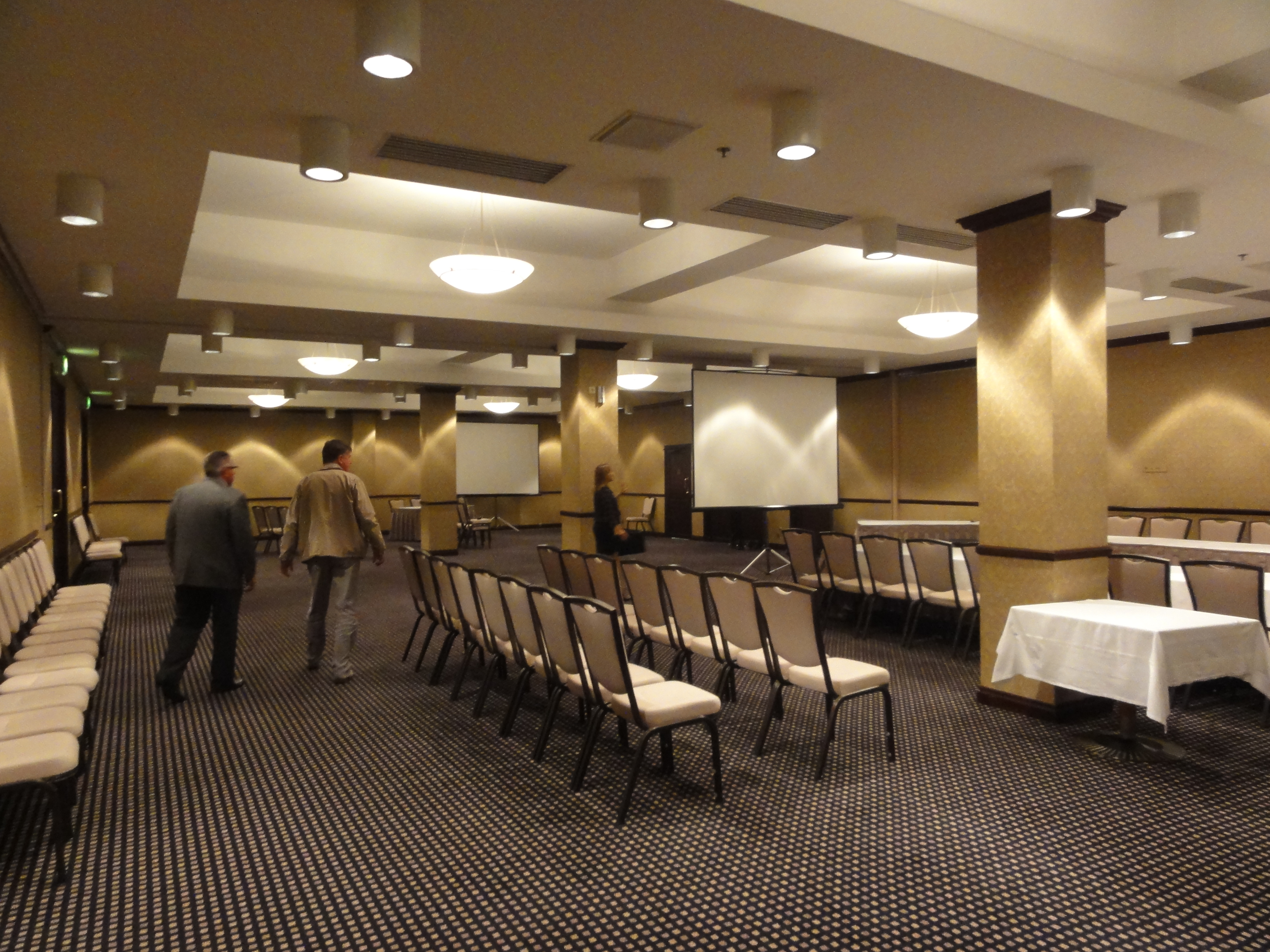
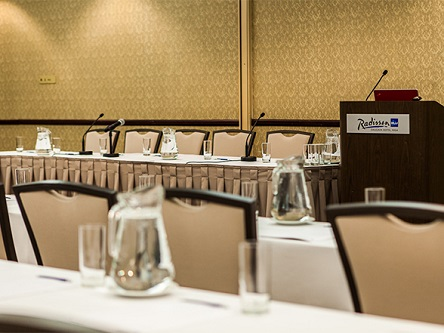
The Saturday programme is for registered participants only. €95 for western Europeans; €45 for post-Soviet nationals; €25 for students.
The following is subject to changes and additions.
The forum begins and finishes with plenary sessions, and four seminar sessions. Each session offers a choice of five topics in the fields of:
• economics • politics • society • religion • environment
See here for a list of speakers and contributors
09.00-10.15
Welcome:
The story continues: living towards shalom – Jeff Fountain, convenor SOEForum
Building on previous forums in Athens, Dublin, Copenhagen and Budapest, we continue our evaluation of Europe today in the light of Robert Schuman’s vision for a ‘community of peoples deeply rooted in Christian values’. We reflect on the values that shaped this remarkable and unprecedented period of 65 years of European peace, while recognising the challenges and opportunities facing us in the fields of economics, politics, society, religion and environment. Through the lens of ‘relational dynamics’, we will seek in our working sessions today to develop a vision of ‘shalom‘ or right-relatedness in each of these fields.
10.30-11.45 The first track sessions will lay a framework of understanding of our current situation in each field. Typically the chairperson for these sessions will introduce the panelists, and explain the framework (5′): each panelist will talk for 10-15 minutes (30′), then panelists can interact with each other’s presentation (15′) before opening to engagement with the floor (20′). The chairperson will bring a summary in closure (5′).
Economics: The root problem – What is the root problem of the financial challenges facing most European countries, especially the southern countries? What values have been neglected? Who, if any, are the main culprits? Is crisis the new normality?
Contributor: Prabhu Guptara Chairperson: Jonathan Tame
Politics: Changing times, changing paradigms – How can we understand the current political landscape? What forces and trends are at work? Why do populist and nationalist parties seem to becoming popular again? What paradigms are changing? What should be the Christian response?
Contributors: Tomas Halik, Tunne Kelam, Andrey Zubov Chairperson: Johannes de Jong
Society/Religion: Towards a post-secular society – European society has become increasingly secular, yet at the same time religion is enjoying a comeback. What is the meaning of this paradox? What do Europeans believe these days and how do these beliefs affect their lifestyles and society in general?
Contributors: Evert Van de Poll, Algis Petronis, Dean Andris Krauliņš. Chairperson: Thomas Bucher
Environment: Is there really an environmental crisis? – Some claim we are facing a very serious environmental crisis. Others decry such talk as alarmist and unfounded. Should Christians be concerned? Is the root problem simply a confluence of natural causes or is there a human responsibility and a neglect of God-given responsibilities?
Contributor: Martin Kaonga Chairperson: Kathia Reynders
12.00-13.15
Economics: The Common Good – the approaches of Personalism and Relational Thinking are explored as alternative approaches to economics and life generally drawing on biblical values. Personalism has shaped Catholic social teaching over the past century, while Relational Thinking has been developed more recently by Dr Michael Schluter with some parallels and some differences.
Contributors: Filip Hove Kristensen, Jonathan Tame Chairperson: Paul de Kloe
Politics: Can democracy & Christianity be separated? What was the role of Christianity in the development of western democracy? Is there a future for democracy if Christian values are neglected? What threats does democracy face today? How can we respond to these threats?
Contributors: Tomas Halik, Tunne Kelam, Andrey Zubov Chairperson: David Fieldsend (tbc.)
Society: Facing a demographic winter – Across Europe, birth rates have dropped to below the 2.1 necessary for sustainability. Some nations, including Germany, are dangerously close to a point of no return. Latvia’s fertility rate is 1.35. Christine Schirrmacher says: Europeans have decided to die out. What is the true situation? What is causing this situation? What are its present and future consequences? What will a society look like where most people have no brothers or sisters, cousins, aunts or uncles? How can we respond?
Contributors: Inga Bite, Algis Petronis Chairperson: Romkje Fountain
Religion: Responding to secular and fundamentalist intolerance–Intolerance, in both secular and religious forms, is growing across Europe and beyond. In the name of tolerance, secularism has its stridently intolerant adherents. While in the Baltics, the presence of Islam is not so keenly felt, in western Europe the tension has grown between respecting others’ rights to worship differently and the loss of traditional European values. What is a truly Christian response to this trend?
Contributors: Jenny Taylor, Evert Van de Poll Chairperson: Christel Ngnambi
Environment:
–
14.30-15.45
Economics: Transforming capitalism– Searching questions are being asked about the future of Capitalism in the light of the debt crisis, excessive levels of executive pay, short-terrorism in share trading, the growing gap between rich and poor, north and south, and the dominance of the financial economy over the real economy of goods and services. Where can we find alternatives which promote economic well-being, financial stability and social cohesion?
Contributor: Prabhu Guptara Chairperson: Andris Ozolins
Politics: Defending the peace– The unprecedented era of European peace lasting since World War Two is the result of the groundwork laid by the EU founding fathers to ‘make war unthinkable’. All that has changed since early last year. Growing misunderstanding between east and west threatens a return to the mistakes of the past. What are the shortcomings on both sides? How can mutual understanding and respect be restored? What are the roles of Christians and of the churches in the task of peace-making? Is re-armament the only way? Can there be a new ‘moral re-armament’?
Contributors: Tunne Kelam, Andrey Zubov, Johannes de Jong, George Rukhadze Chairperson: Jonathan Tame
Society:
–
Religion: Defending Freedom of Religion & Belief (FoRB)–What are the problems in Europe concerning this area of freedom? Should we demand religious freedom for Christians only? or also for Muslims and people of other faiths? Why is FoRB a task for us all? Why is this freedom crucial for all the other freedoms? What happens when it is lost? What do our governments do about it? What should the government’s role be? What message do we need to give to our governments? What can we, a small minority, do about it?
Contributors: Julia Doxat-Purser, Christel Ngnambi Chairperson: David Fieldsend (tbc)
Environment: Dare to care – Is there a biblical and practical response to climate change and environmental stewardship? Is the idea of caring for the poor rather than for the planet a false and unbiblical distinction? This session will propose that the problem of climate change runs much deeper than merely being a scientific problem to solve or a political issue to debate – it is the whole way we live our lives today. Our entire lifestyles need challenging and changing. What basic principles can guide us in living out our faith on this increasingly polluted planet? How can we as Christians respond to this environmental crisis?
Contributor: Martin Kaonga – Chairperson: Paul de Kloe
16.00-17.15
Economics: Lessons from the Baltics– What we can learn from how the Baltic states transformed themselves from Soviet satellites with planned economies to independent nation members of the EU, and liberal democracies with free-market economies, despite the financial crisis? Are there lessons for nations which were democracies long before the Baltics and yet teeter on bankruptcy? What are the remaining challenges for the Baltics economically? How can relationally-oriented economic practices help?
Contributors: Tunne Kelam, Ainars Bastiks Chairperson: Jurgis Klotins tbc
Politics: Promoting Christian values in a post-modern political world–From his long experience of promoting Christian values in politics, especially in Eastern Europe and now in Brussels, Leo van Doesburg offers insights and guidelines for those working in a changing political landscape of relativism, populism, opportunism, and pragmatism, a world where the old ideologies that birthed political parties are not longer considered relevant.
Contributor: Leo van Doesburg Chairperson: Johannes de Jong
Society: Europe’s unfinished business–Forgiveness and reconciliation, especially between France and Germany, midwifed the birth of what we know of as the EU today. Peacemakers like Schuman and Adenaeur understood the importance of what they called ‘a European spirit’ – the choice for the welfare of the whole community of peoples. The task is far from finished as recent events have sharply reminded us. How can we recapture the original European spirit and take it into the future?
Contributors: Antoine Jaulmes, Cathy Nobles, Cardinal Pujats Chairperson: Jeff Fountain
Religion: Battling religious illiteracy in the media–Many news stories do not make sense – whether to journalists or policy makers who feed off what they report – without understanding religion. Religious literacy seeks to increase understanding among journalists and opinion formers of the way religion shapes world affairs. Religiously literate journalism goes deeper to the sources of social motivations, and can provide resources for other journalists. Dr Jenny Taylor set up an agency called Lapido Media based in London to work with civil society groups on campaigns and media strategy to improve the flow and quality of stories with a religion dimension.
Contributors: Jenny Taylor Chairperson: Julia Doxat-Purser
Environment: Sustainability & east-west tensions–While ‘developed’ nations pressure ‘developing’ nations to raise anti-pollution standards, objections are raised that the western nations have a head start on the others prior to imposing stricter standards. Those nations trying to catch up need more leniency when it comes to environmental standards. But is such an arrangement sustainable? Have the ‘developed’ nations already pushed the limits too far thus robbing others of the opportunity to close the gap with the leaders? These questions create further east-west and north-south tensions also within Europe and threaten the sustainability of our global environment. What can be done?
Contributor: Martin Kaonga Chairperson: Kathia Reynders
17.30-18.30
Closing plenary session: Imagining Europe – what could it look like?
A panel with Tomas Halik, Andrey Zubov, Prabhu Guptara, Inga Bite, Martin Koana and Julia Doxat-Purser help stir our imaginations about the kind of Europe that would please God, incorporating insights from the day’s working sessions.
Chairperson: Jeff Fountain
See here for a list of speakers and contributors
Friday programme, St Peter’s 7.30pm
